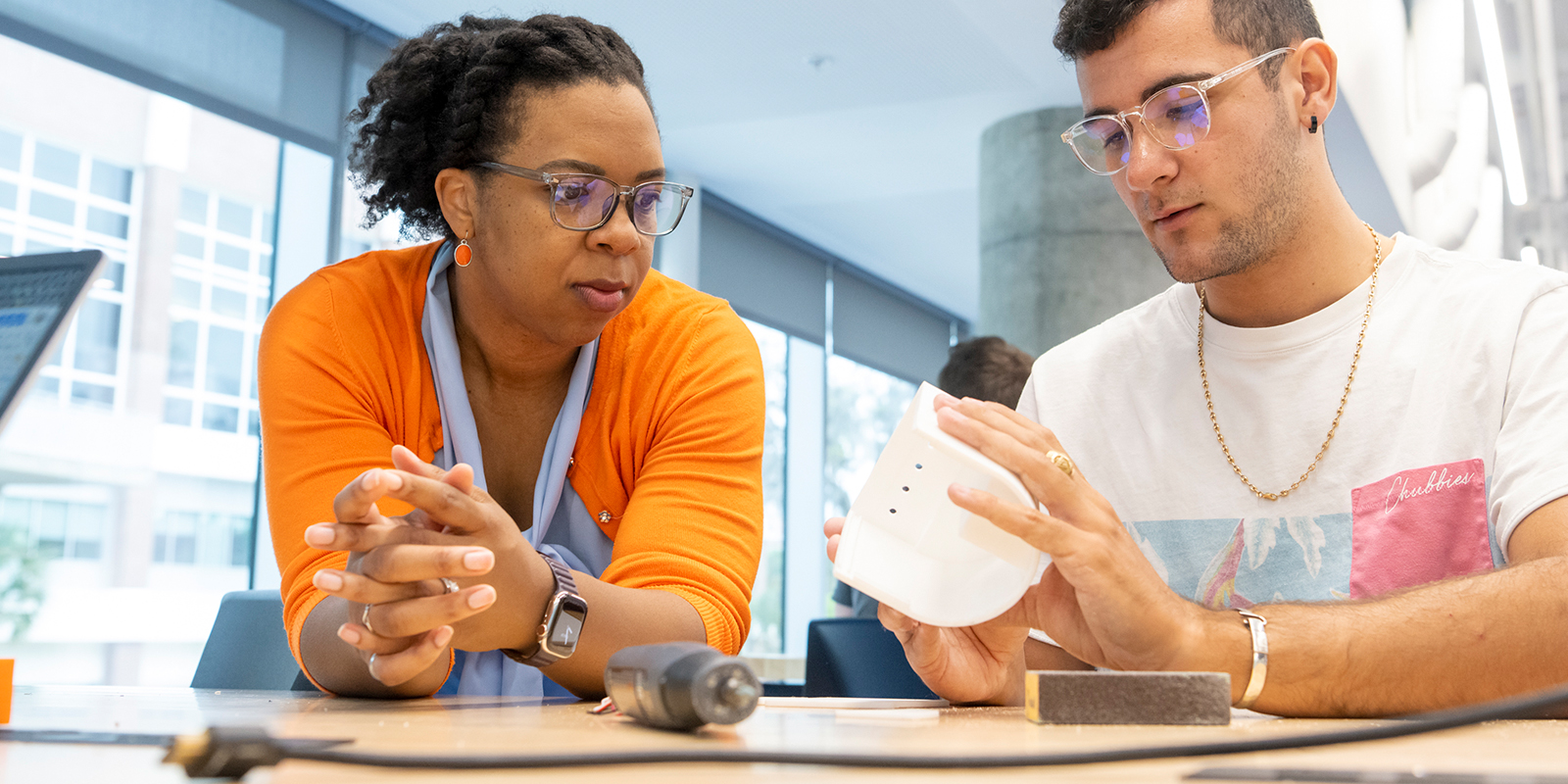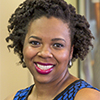
Posted: January 4, 2024
January is National Mentoring Month, and in the spirit of that occasion, the University of Florida Graduate School turns to someone who knows mentoring here from two angles — as a UF student turned UF faculty member!
 Dr. Jeremy Magruder Waisome (pictured left and above), Thomas O. Hunter Rising Star Assistant Professor in the UF Department of Engineering Education, is a three-time UF alumna: Bachelor of Science in Civil Engineering (2010), Master of Science in Civil Engineering (2012), and Doctor of Philosophy in Civil Engineering (2017).
Dr. Jeremy Magruder Waisome (pictured left and above), Thomas O. Hunter Rising Star Assistant Professor in the UF Department of Engineering Education, is a three-time UF alumna: Bachelor of Science in Civil Engineering (2010), Master of Science in Civil Engineering (2012), and Doctor of Philosophy in Civil Engineering (2017).
In addition to serving as UF faculty, she is a member of the NASEM (National Academies of Science, Engineering, and Medicine) Roundtable on Mentorship, Well-Being, and Professional Development, a trained facilitator for CIMER’s (Center for the Improvement of Mentored Experiences in Research) Entering Mentoring curriculum, faculty advisor to the National Society of Black Engineers’ UF chapter, and a recipient of the FEF (Florida Education Fund) 2023-2024 William R. Jones Outstanding Mentor Award.
An avid science communicator, she previously hosted UF’s Unstoppable Minds podcast.
Let’s join her for a bit of Q&A with the Graduate School about mentoring.
GS: Dr. Waisome, your research interests relate to effective mentoring strategies that broaden representation in STEM fields. What can you tell us about effective mentoring?
JW: Effective mentorship is evidence-based. It’s rooted in practices we know work, and not based on anecdotes or personal preferences. It’s a skill that is practiced so that you can continuously improve, just like any other skill. A definition I like to use is from the National Academies of Science, Engineering, and Medicine’s consensus study on the Science of Effective Mentorship in STEMM, which states: “Mentorship is a professional, working alliance in which individuals work together over time to support the personal and professional growth, development, and success of the relational partners through the provision of career and psychosocial support.”
GS: Tell us a bit about the mentoring you received as a graduate student at UF.
JW: My more traditional dyadic mentoring relationships came primarily from individuals I met outside of my research group. Drs. Angela Lindner, Hank Frierson, and Juan Gilbert come to mind. They were instrumental in my success during graduate school. We strategized ways to approach my research, advisor relationship, and career goals. They were my champions, advocates, coaches, and so much more. I cannot thank them enough for the time and support they have provided me. I also have peer and near-peer mentors who helped me survive the graduate school experience. Oftentimes, these interactions were within specific groups, like my NSF (National Science Foundation) Bridge to the Doctorate cohort or members of the National Society of Black Engineers. And the students in my research group helped me normalize my experience. I could not have graduated without this constellation of support I received from across campus and the United States.
GS: Now that you are a UF faculty member, do you see mentoring from a different perspective? How?
JW: I don’t think I ever considered mentorship as scholarship while I was a student. I recognized that it was an important aspect of my trajectory, however. I learned about the research space of mentorship in STEM while I was in my last year as a graduate student. I worked on a project that focused on broadening participation in computing (BPC) through mentorship. I began reflecting on my trajectory and realized that at every stage in my career as a student, I had at least one mentor. I was then hired to be the project manager of that project, which was the NSF-funded BPC Alliance: The Institute for African American Mentoring in Computing Sciences. I realized this was an area of research that was understudied and decided to focus my career on this space. So, I absolutely have a different lens than I did as a student.
GS: What should graduate students look for in a mentor?
JW: According to research, it depends! I think the first step is understanding the why. There are many contexts in which you might seek out a mentor. Recognizing the type of individual(s) and the purpose of the relationship is a great place to start. You can do this by using a mentor map — the NCFDD Mentor Map is a great tool for that. The other piece of advice I would share is that you should find someone who shares your values and will support not only your career development, but also you as an individual. To do that, you need to know what you value. So, taking time for self-reflection before engaging in a mentoring relationship is key.
GS: Any tips for graduate faculty who are engaged in mentoring graduate students?
JW: I mentioned earlier that mentorship is a skill. Some of us practice it without even being aware. However, we can always improve on our skills. I would encourage graduate faculty to seek out professional development opportunities on mentorship. January is National Mentoring Month and there will be a lot of resources posted online about mentoring. There is also training through the Center for the Improvement of Mentored Experiences in Research, the National Research Mentoring Network, and others that offer online resources for faculty. And at UF, if you want more direct training, check out the UF Mentor Academy offered by CTSI (Clinical and Translational Science Institute).
GS: Thank you so much, Dr. Waisome, for your time, insights, and leads.
JW: Thank you so much for all you do to support our graduate students.
 Graduate School
Graduate School

 Dr. Jeremy Magruder Waisome (pictured left and above), Thomas O. Hunter Rising Star Assistant Professor in the
Dr. Jeremy Magruder Waisome (pictured left and above), Thomas O. Hunter Rising Star Assistant Professor in the